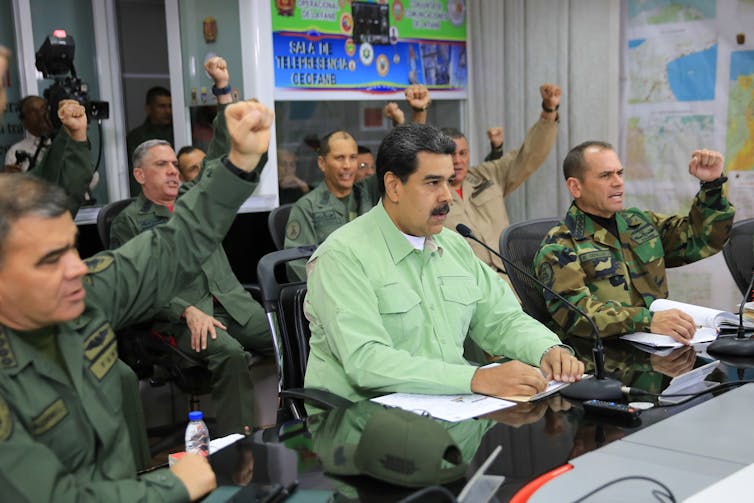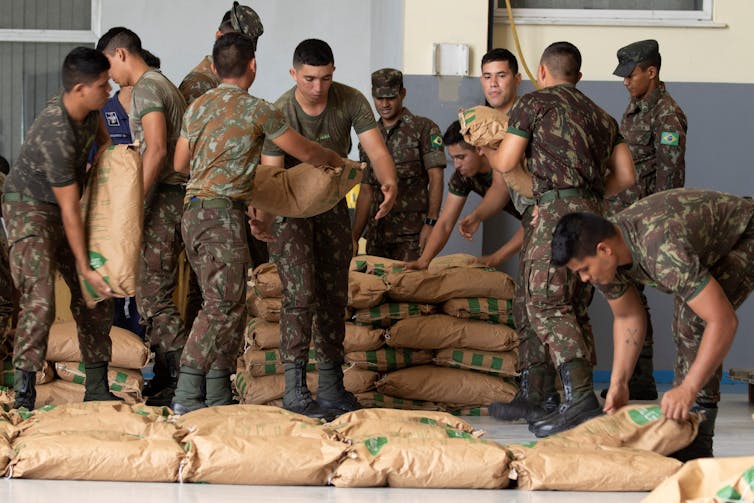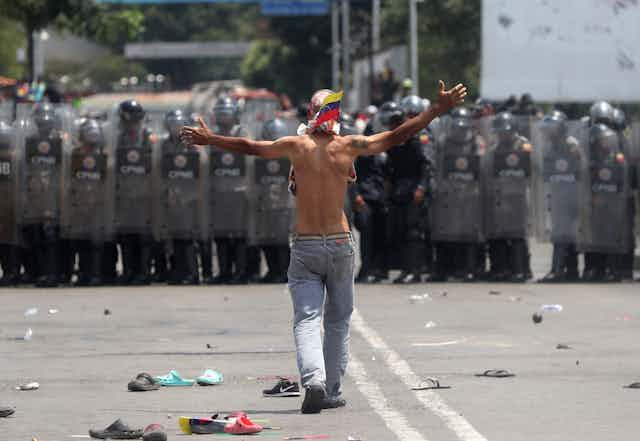Venezuela stands close to the brink of another revolution. Acute shortages of food and medicine, along with quintuple-digit inflation, has led to an economic crisis.
With a large amount of much-needed humanitarian aid being held at Venezuela’s borders with Colombia and Brazil, things could turn very violent (some skirmishes have already taken place). The aid has been sent by the US and other international supporters of opposition leader Juan Guaidó. Together they brand President Nicolás Maduro a dictator, believing that he rigged his election in May 2018, and demand that he now stand down and restore democracy. But the army, so far, remains loyal to Maduro and troops have barricaded the border crossings to prevent aid from entering – something Maduro fears is a prelude to US invasion.
In applying my research to the situation in Venezuela, it’s clear that things could soon come to a head. My research shows how dictators can manipulate their trade policies to bolster their political survival, foreclosing democratisation in this process. Using an economic model, I strip these types of situations down to a few essential ingredients, simplifying an extremely complex set of circumstances to facilitate deeper insight into how they work. Using my model to think about Venezuela’s situation, we can see precisely the role that the world’s powerful countries play through their sanctions and aid in shaping Venezuela’s prospects for democracy.
Keeping people happy
The basic logic of my model is that the Maduro regime, even as a dictatorship, has to keep the population happy just like any other political regime. After all, while democratic regimes worry about losing power at the ballot box, dictators fear revolution.

The model assumes that people have a sense of how life will be if they overthrew the Maduro regime, through a revolution, paving the way to democracy. Revolution is of course extremely costly and dangerous. But if life becomes so tough for ordinary people that they ultimately feel revolution is worth the costs, then Maduro has the threat of revolution on his hands.
Maduro’s options in the face of the threat of revolution include repression – something he has already experimented with. But, from his perspective, repressing his own people is extremely costly politically. It is also risky, especially when this entails turning against his own support base.
Plus, many members of the military are unwilling to turn their weapons on their own people. This elevates the danger that military repression will ultimately backfire and lead to Maduro’s downfall. More than 100 soldiers are said to have defected during the clashes over aid deliveries.
A better option for Maduro than military repression would be to try and improve the welfare of ordinary people, making them more prepared to live with the status quo of his rule and less inclined to spark a revolution. Adopting this approach is in line with Maduro’s claims that there isn’t any crisis in the country. This is where Venezuela’s vast oil reserves could help him.

One of the insights one gains from viewing this situation through the lens of my model is that dictators can stay in power by using commodities like oil to import food and hence placate the populace. Venezuela’s ability to produce oil has been badly curtailed by the economic chaos engulfing the country, but the oil it does still produce could help Maduro shore up his survival.
This is where international economic policy becomes critical. The EU and US have levied sanctions on Venezuela’s exports, which means they have committed not to buy Venezuela’s oil. This, in turn, hinders the regime’s ability to use its oil to buy the food that Maduro needs. Having food to offer to his population is what stands between Maduro and the threat of a full-blown revolution.
Read more: Venezuela: a humanitarian and security crisis on the border with Colombia
Seen through my model, the explicit purpose of sanctions is to deny Maduro that lifeline, pushing Venezuela to the brink of a revolution. Of course, China and Russia’s support for Venezuela works in precisely the opposite direction, turning Maduro’s survival into a tug of war between the world’s major powers.
Uncomfortable truths
The uncomfortable truth is that, although the purpose of sanctions is to put pressure on the Maduro regime, this glosses over an important aspect of how the pressure works. It works by pushing the Venezuelan people to the point of desperation where they are prepared to risk everything in a revolution rather than live with the status quo.
Yet a second uncomfortable truth arguably outweighs the first. Failing to push the Venezuelan people to the brink of revolution will probably lead to a longer period under the Maduro dictatorship, delaying democratisation in Venezuela and entrenching the current misery.
At first sight, US food aid seems to undermine the above rationale. If food is Maduro’s lifeline, and if the purpose of sanctions is to destabilise the Maduro regime by depriving it of food, why send food aid?
I don’t think there was ever any expectation that the Maduro regime would accept the aid. Its purpose was to draw Venezuelan troops to the Colombian border, away from the capital city Caracas, and that is exactly what it has done. This further reduces Maduro’s ability to use the military to repress an uprising in the capital Caracas, further heightening the risk of revolution. It also increases the Venezuelan people’s temptation to overthrow the Maduro regime, because then they could gain access to the food aid immediately.
Another revolution is neither inevitable nor desirable. But, in my view and following the logic of the model I have developed, Venezuela has to get to the brink of revolution before it has any hope of finding the path back to meaningful democracy.

